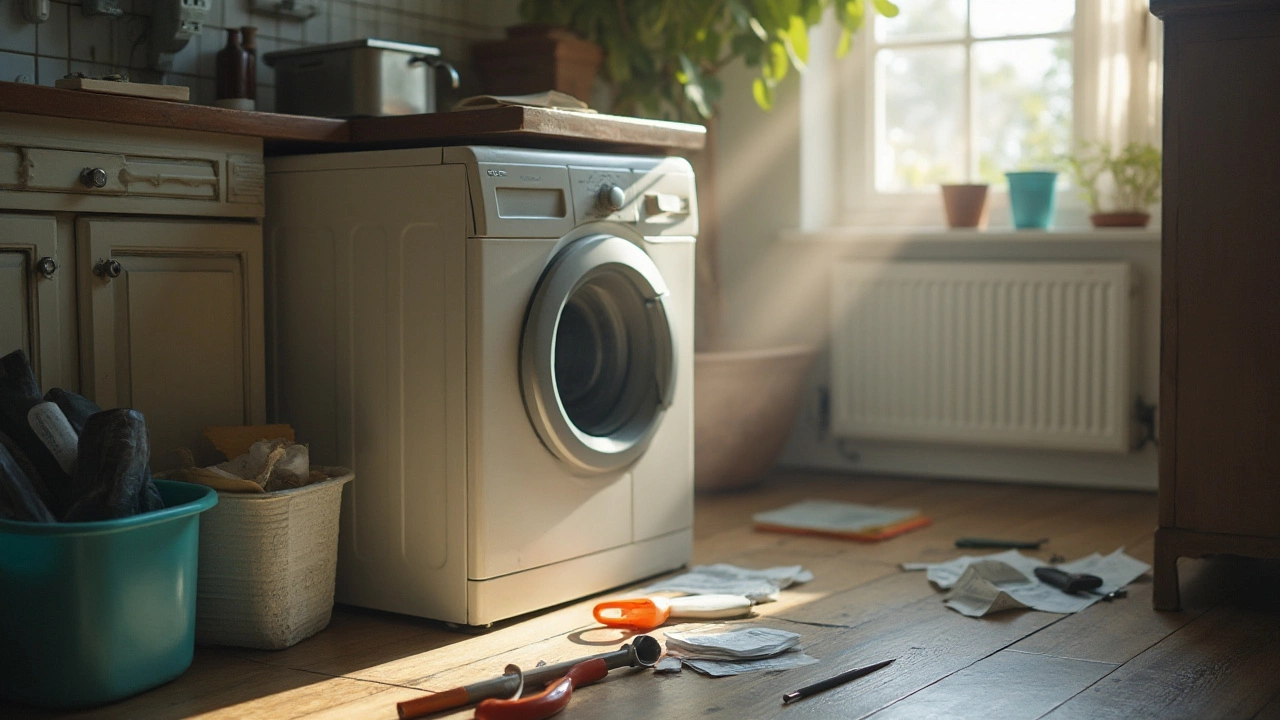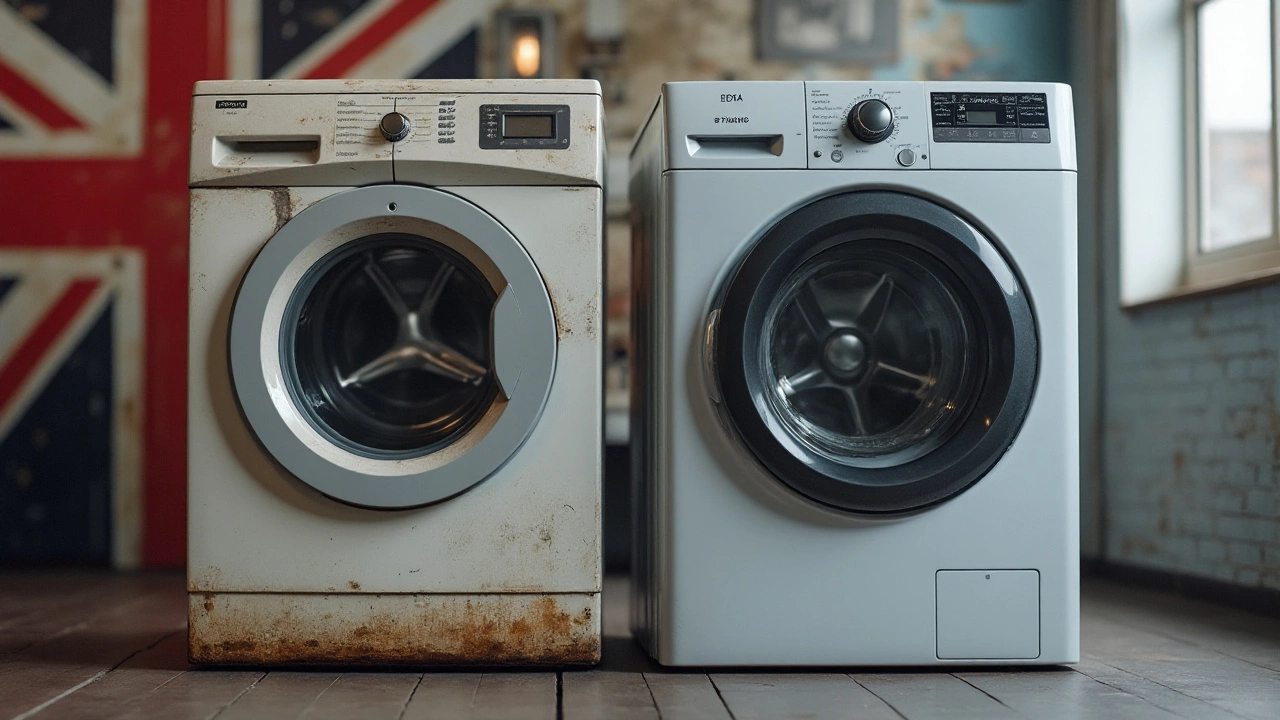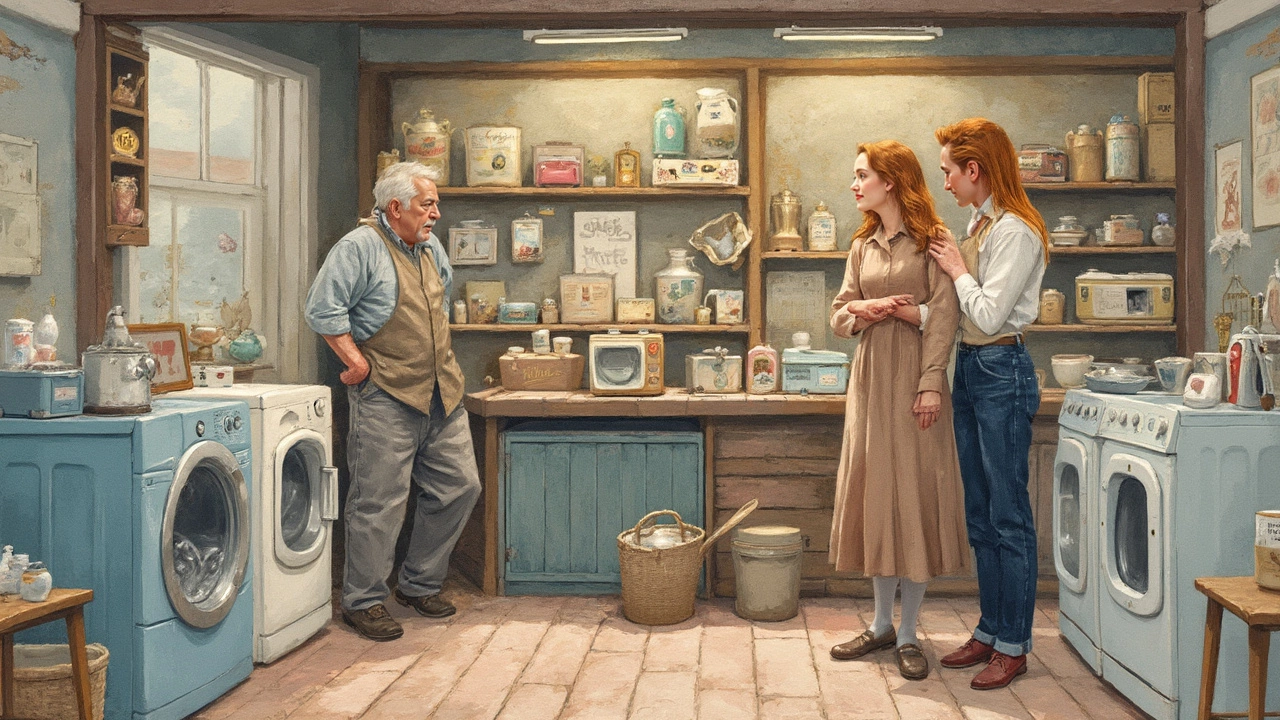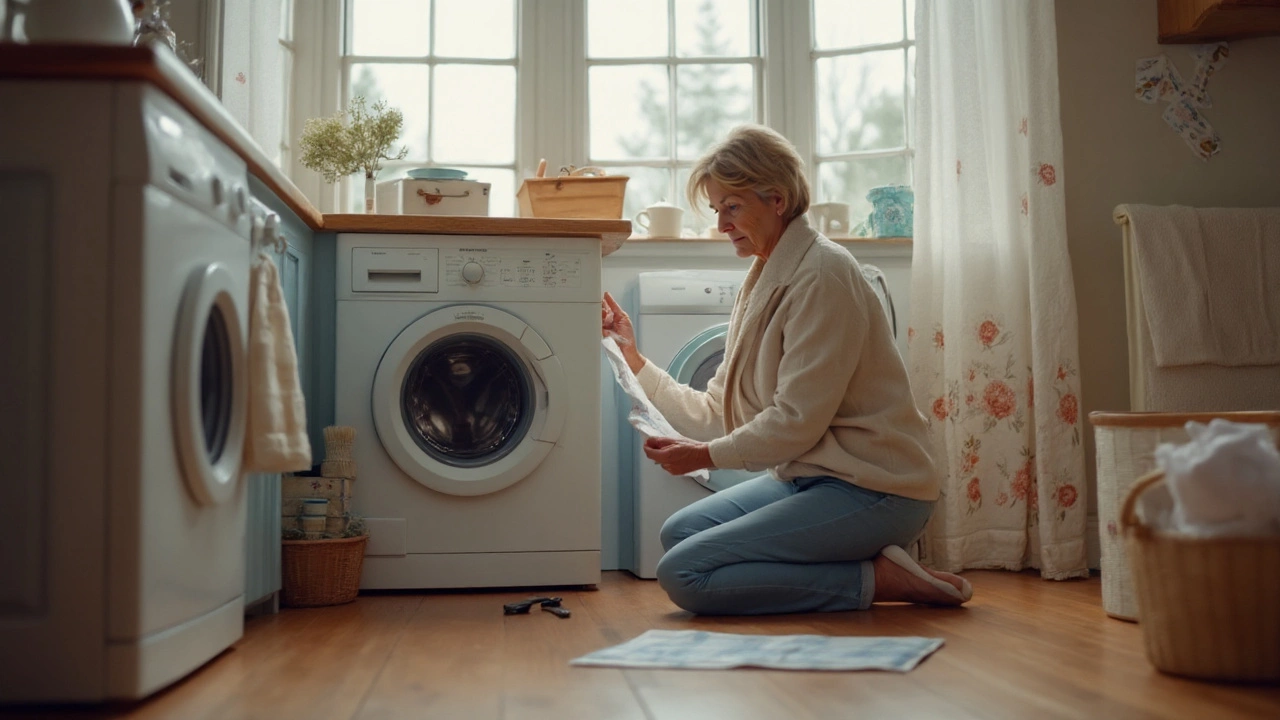
- 16 Jan 2025
- Gideon Thornton
- 0
When your trusted washing machine starts acting up after serving you for seven years, you might find yourself at a crossroads: should you repair it or consider a new purchase? It’s not a straightforward decision, as several factors come into play. Understanding these considerations can save you from unnecessary expenses and possible regrets.
Most washing machines are built to last around a decade, but this doesn't mean a seven-year-old model is close to expiring. Many of them can continue running well beyond their expected lifespan with consistent maintenance and an occasional fix. However, as appliances age, problems can become more frequent and consequential.
This article delves into the gritty details—assessing common issues faced by seven-year-old machines, estimating repair costs in comparison to replacements, and considering the advantages of modern, energy-efficient models. We'll also share insight on how you can extend the life of your current appliance. Let's figure out the best route for your household needs, ensuring clean laundry with minimal hassle and expense.
- Understanding the Lifespan of a Washing Machine
- Common Problems at the 7-Year Mark
- Cost of Repairs vs. Replacement
- Benefits of Upgrading to Newer Models
- Eco-Friendliness and Efficiency Considerations
- Tips for Extending Your Washing Machine’s Life
Understanding the Lifespan of a Washing Machine
Most homeowners rely heavily on their washing machines, expecting them to faithfully cycle through loads of dirty clothes for years on end. But how long should a washing machine actually last? The expected lifespan of modern washing machines is typically around 10 to 13 years. This span isn't set in stone, as it is influenced by a variety of factors including brand, model, usage patterns, and maintenance routines.
Usage plays a major role in determining longevity. Machines subjected to frequent or heavy loads may experience wear and tear more rapidly than those that see infrequent use. For instance, a household with several children is likely to employ the machine multiple times a week, which can expedite the aging process. It's also worth noting that the type of water—hard or soft—can impact machine performance over time due to mineral buildup.
In terms of maintenance, regular check-ups and care can significantly extend a washing machine's life. Simple routines such as clearing filters, checking hoses, and using the right detergents help prevent wear and dysfunction. According to the consumer advocacy group Which?, 'routine maintenance can add several years to your appliance’s service life and maintain performance at a top level.' Appliance maintenance thus plays an indispensable role in your decision about whether to repair or replace an aging machine.
Beyond everyday wear and maintenance, advancements in technology can also influence lifespan. Many current machines come with smart features and efficient energy use, which may inspire a sooner upgrade, not because the older model is failing, but because the new features are more appealing. While older machines could be hampered by outdated technology, newer models offer water and energy-saving benefits, which might lead some homeowners to consider upgrading even while the existing unit operates acceptably.
Looking at the repair side, it’s helpful to know some typical issues that can crop up over time, which often include broken knobs, malfunctioning doors, and erratic cycles. While these issues might sound minor, they can result in hefty repair bills. Understanding when a washing machine repair is viable—versus when it's time to let go—can be the difference between wasting money and making a cost-effective decision.
When thinking long-term, recognizing the expected lifespan of a washing machine permits homeowners to plan carefully. Investing in a reliable brand known for durability can often mean fewer headaches down the line. By staying informed about factors that extend or reduce machine life, owners can better weigh the benefits of repair or replace. The key takeaway here is that being proactive in care, while keeping an eye on technological advancements, will offer the best chance at maximizing both the longevity and performance of your washing machine.
Common Problems at the 7-Year Mark
As time trots along, so does the wear and tear on your faithful washing machine. At the 7-year mark, several issues can start to rear their heads, and being aware of these can help in deciding whether to go for repair. One of the frequent concerns is the dreaded water leakage, which often traces back to faulty seals or hoses. This might begin as a small trickle, hardly noticeable, but can quickly escalate, potentially damaging floors and demanding costly repairs. Experts often advise that regular inspection of seals can prevent such mishaps.
Another bane for aging washing machines is noise. That serene hum you're used to might turn into a raucous clatter. Worn-out drum bearings are usually the culprits here, leading to a distressing racket during spin cycles. Repairing or replacing these bearings isn't always straightforward and can rack up quite a bill, urging some folks to reconsider keeping their old machine.
"Consider the noise levels of older washing machines as an indicator. Excessive noise can signal internal mechanical issues," remarks a leading appliance repair technician, offering his professional wisdom on the matter.Electrical issues also tend to be more common as your machine ages. Malfunctions in the control panel or the motor such as sudden stops, failure to start, or random resets can become regular occurrences. Such problems require a more invasive diagnosis, typically involving the expertise of a professional repair service. These repairs are often unpredictable in both cost and effectiveness.
Let's not forget the build-up of mold and mildew. Over time, soap scum and debris accumulate, making the washing machine a hospitable environment for unwanted guests—especially if it resides in a moist environment. Smelly machines aren’t just an annoyance but a hygiene risk, affecting the cleanliness of your laundry. This problem can be managed to some extent with diligent cleaning and occasional maintenance runs using cleaning agents designed for appliances.
Running a washing machine for several years also starts to show in its energy consumption. Older models often lag in efficiency compared to newer counterparts. A washing machine lifespan reaches a point where it guzzles significantly more energy, becoming a silent contributor to rising utility bills. Inefficiency is often linked to mechanical wear and reduced effectiveness in churning and washing cycles.
These issues, while common, vary in their seriousness and cost to fix. It's important to recognize these signs and weigh them against the benefits of purchasing a new model. Keeping an eye on these potential problems might be your best defense against unexpectedly high repair costs.

Cost of Repairs vs. Replacement
Facing the dilemma of whether to repair or replace an older washing machine often boils down to financial prudence. The average cost of repairing a washing machine can vary widely based on the type of malfunction and the model of your appliance. Common repairs, such as fixing a drum issue or replacing a motor, can range anywhere from £100 to £300. Given that a new washing machine might set you back between £300 and £700 or more for high-end models, this comparison can be daunting.
The nature of the repair is another factor that must be weighed carefully. A simple leak repair might take an hour with minimal parts replacement. In contrast, a faulty motor or control board can not only jack up the repair cost but may also extend the time your machine is out of commission. It’s important to ask yourself: is your current model worth the repair, or would spending the equivalent of 50% or more of a new machine's price justify replacing it instead?
Appliance maintenance experts often suggest applying a rule of thumb known as the “50% Rule”. If the cost to repair your washing machine reaches or exceeds 50% of the cost of a new machine, it’s generally advisable to opt for replacement rather than repair. This rule helps guide decision-makers past potential future repairs that could lead to cumulative costs exceeding a new model’s price. Consider the long-term savings in energy efficiency and reliability that a newer model could bring.
“When estimating repair costs, always consider the age and condition of your appliance,” advises a representative from a major appliance repair service. “Sometimes, a seemingly inexpensive fix today doesn't outweigh the benefits of upgrading to an energy-efficient model that cuts utility bills in the long run.”
Another aspect to consider is warranty coverage. If your machine is still under warranty, which is less likely with a seven-year-old appliance, the decision might lean towards repair since manufacturers will typically cover parts and labor. If the warranty has expired, you’ll be responsible for the entire repair bill. For many homeowners, buying a new machine with a fresh warranty can feel like a more secure investment.
Making a decision requires a fair amount of assessment, balancing immediate costs with future benefits. Some homeowners even prefer to consult professionals for an accurate diagnosis, hence avoiding the risks of self-assessment errors. Remember, aligning your choice with your budget, needs, and the potential advantages that modern technology can offer is the key to an optimal resolution.
Benefits of Upgrading to Newer Models
Deciding to transition from your loyal old washing machine to a sparkling new model can come with a host of unexpected advantages. Many households may not initially consider that advancements in technology have paved the way for washing machines that offer substantial enhancements in efficiency and functionality. For starters, many new models boast improved water and energy efficiency, which not only contributes to lighter utility bills but also aligns with growing environmental concerns. Imagine cutting down your water usage by nearly half with a newer model compared to an older one. It's not just good for the pocket—it's a step towards sustainable living.
Moreover, the modern washing machine landscape has experienced significant shifts in design and capability. We're seeing smart integrations that allow you to control your machine with a simple tap on your smartphone. Whether you're busy in the kitchen or lounging in the living room, the flexibility to start, stop, or even receive maintenance alerts through an app is immensely practical. Alongside these conveniences, features like customizable wash cycles can cater specifically to the fabric type, ensuring that your clothes last longer and maintain their vibrancy. These aren’t simply add-ons; they reflect a technological evolution intended to sculpt a seamless user experience.
A study by the Energy Saving Trust points out, 'Older washing machines can be responsible for over 10% of household energy consumption, whereas modern energy-efficient models can drastically reduce this figure.' This insight underlines the significant impact of appliance efficiency on household energy use. Newer models are compliant with rigorous energy standards, which means they deal gently yet effectively with each load while consuming less power. Updated technology often equals increased lifespan and lower maintenance needs, as machines are built to better withstand regular wear and tear.To put things into perspective, let’s break down a potential transition to a new machine in terms of cost savings.
Old Model New Model Water Usage (per cycle) 35 gallons 20 gallons Energy Usage (kWh/year) 500 300 Average Lifespan 10 years 15 years Significant advancements have also been made in noise reduction technology. Where older units often disrupted peace with their wash cycle clamor, newer designs operate on quieter mechanisms, making them ideal for smaller homes or urban living where space-sharing is a priority. Additionally, most new machines come with extended warranties, offering an extra layer of assurance about their long-term use. Not to mention, should you decide to sell your property, having a modern, eco-friendly appliance can potentially enhance its market value. Indeed, investing in a new washing machine doesn’t just improve your daily laundry routine—it reflects an overarching commitment to a smarter, more eco-conscious lifestyle.

Eco-Friendliness and Efficiency Considerations
Today, more than ever, the importance of considering the environment when making household decisions cannot be overstated. An aging washing machine might still have a lot of life left in it, but one must evaluate its impact on both the electric bill and the planet. New models of washing machines have been designed to be more energy-efficient and consume less water than their older counterparts. Appliance maintenance often involves considering whether keeping an older machine running is truly beneficial in the long term.
Many of the washing machine models available today are certified by programs like Energy Star, which ensure they meet certain criteria for energy use. This certification means these machines reduce the amount of greenhouse gases emitted by decreasing the energy demand. Additionally, they can cut down water usage by up to 40% compared to older models. These advancements not only help save the environment but also translate to substantial savings on utility bills over time. Deciding between repair or replace involves weighing these benefits against the initial cost of purchasing a new model.
The Environmental Protection Agency states that "choosing Energy Star-certified products can save more than £200 annually on household energy bills while significantly reducing carbon footprint."These days, an eco-conscious mindset leads many to prefer appliances that offer sustainability benefits. However, it's essential to determine whether your current machine can be brought closer to such standards with a simple fix or upgrade, like replacing old parts with more efficient components.Increasingly, regulations and consumer demands are pushing manufacturers to innovate. The result is a market full of smart washers able to optimize the wash cycle based on the load, thus enhancing both efficiency and product longevity. These machines often feature programmable settings that enable users to reduce their load's environmental impact further. If your older machine lacks these capabilities, the question arises whether sticking with it makes sense or if it's time to invest in these technologic advancements now commonplace in new designs.
Should you decide that repairing your current model is more prudent, keep in mind these repairs should ideally lower your machine's ecological footprint. Even minor adjustments, like fixing leaks or routinely cleaning the components, could substantially improve its efficiency and durability. Regular maintenance checks are not only practical in extending the washing machine's lifespan but also in ensuring it consumes the minimum amount of resources necessary. This way, you contribute to sustainability without having to overhaul your appliance fleet.
In valuing eco-friendliness and efficiency, remember that the true cost of a machine isn't just its purchase price or the expense of washing machine repair. It involves the long-term economic and environmental cost, urging us to think beyond today. Whether you choose to fix your washing machine or replace it with a more modern version, prioritize solutions that align harmoniously with the values of frugality and ecological responsibility.
Tips for Extending Your Washing Machine’s Life
In the quest to keep your washing machine running smoothly, unlike those unfortunate souls who are always shelling out for costly repairs, adopting a proactive approach can make a world of difference. Like any piece of machinery, your trusty washer thrives on regular attention and small, consistent maintenance efforts. With just a little know-how and effort, you can delay that inevitable trip to the appliance store for a new model. Many washing enthusiasts point out that taking care of your washer is akin to looking after a pet: feed it well, keep it clean, and it will serve you faithfully for years.
Start by making a habit of checking the pockets of your clothes before tossing them into the wash. Loose change, buttons, or unintended items can wreak havoc on the drum and inner mechanics over time. Additionally, it’s recommended to get into the groove of using the right detergent and amount. Excessive suds from too much detergent can leave a residue that’s harmful over time. Speaking of detergent, why not consider high-efficiency versions? They’re designed to leave minimal traces and work wonders in preserving the mechanisms of your machine.
"Your washing machine will thank you for treating it kindly,” says appliance expert Sally Hodgkins, “and the payoff is often more years of reliable service."Ensure the drum doesn't start resembling a science project by cleaning it regularly. Over time, detergent and fabric softener can leave a residue that isn’t healthy for the internal workings of the machine or your clothes. Run an empty hot wash cycle once a month with a cup of white vinegar to clear any build-up. You'll be surprised at how something so simple can prevent repair headaches down the road.Let's not neglect the unseen parts which often escape our routine checks, like the hoses. They play a pivotal role in the operation of your machine. Inspect them regularly for bulging, cracking, fraying, and leaks around the ends. As a rule of thumb, replace your hoses every five years or when you spot wear. Doing so can save you from unexpected flooding disasters which could offer you an unwelcome surprise.
Finally, while it may seem trivial, making sure your appliance is balanced can be game-changing. Vibrations caused by an unbalanced machine can significantly reduce its lifespan. If the vibrations are so intense that they’re moving the washer across the room, it might need to be leveled. Check your manual or consult online guides which can help you with leveling using simple tools available at home.
Adopting these habits won’t just extend the life of your washing machine, but they will also ensure it remains a reliable companion in your household chores. Little steps can make significant impacts, resulting in fewer repair bills and more peace of mind in your laundry endeavors.



